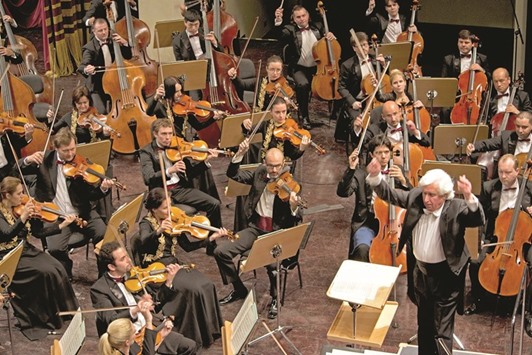It has been a fantastic season for the Qatar Philharmonic Orchestra (QPO) what with them having performed more than 50 public concerts this season. With only four more to go in the month, it sure sounds like it will be a smooth melodious transition into the summer for Doha’s music lovers.
Two of the orchestra’s principal players will perform as soloists, the QPO says. On May 13, in the Katara Opera House, Rony Moser will perform Wolfgang Amadeus Mozart’s Clarinet Concerto, written just two months before Mozart’s death. Flying in the face of the mythology surrounding Mozart’s last days, the music is generally high-spirited.
Indeed, an 1802 essay in Allgemeine Musikalische Zeitung stated, “The reviewer, who has this magnificent concerto lying before him in score form, can impart to all good the happy certainty that none other than Mozart – only he – can have written it; that consequently it must be, in view of the beautiful, tasteful and proper composition, the foremost clarinet concerto in the world; for, so far as the review knows, only this one by him exists.”
The May 13 concert also includes Bedrich Smetana’s Overture to The Bartered Bride, with its celebration of Czech folk dance, and Antonin Dvorak’s Seventh Symphony. Tomas Netopil, Music Director of the Aalto Theatre and the Philharmonie Essen, will conduct the orchestra.
Executive Director of QPO, Kurt Meister told Community, “With all this music for aficionados I wanted to close the season with some universally popular and superb music. So we have added a concert on June 4 with Mozart’s Symphony No. 40 in G Minor, one of the greatest of all symphonies and surprisingly one we have never performed. Johannes Brahms’ Second Symphony, perhaps the most ingratiating of all symphonies, will close the curtain until next year.”
On May 21, Nicole Pressler, principal flute in the Qatar Philharmonic, will play Jacques Ibert’s Flute Concerto, written in 1934 as a commission for the French virtuoso Marcel Moyse. Ibert’s witty and frightfully difficult music made the music a favourite of performers and audiences alike. Its range of technical challenges led the Paris Conservatory to immediately start using it for competitive auditions.
The May 21 concert will be led by Dmitrij Kitajenko, Conductor of Honour of the Qatar Philharmonic Orchestra. Opening the programme will be Felix Mendelssohn’s Scottish Symphony, the Third, which was inspired by a walking tour the young Mendelssohn took in the British Isles, a QPO spokesperson explained. The ruins of Edinburgh’s Holyrood Abbey, which burned in the 17th century, led to Mendelssohn’s atmospheric music. A third country, Spain, features in the programme with Nikolai Rimsky-Korsakov’s Capriccio Espagnol, a colourful and evocative piece that requires a virtuoso ensemble like the Qatar Philharmonic.
A week later, on May 28, Dmitrij Kitajenko conducts Robert Schumann’s Fourth Symphony. The Fourth is Schumann’s most adventurous symphonic work in terms of form, using the cyclic and episodic style that characterises his piano music. But then, Schumann was attempting to depict his wife, Clara, and what a human being looks like in sonata form, one wonders.
Noted violinist Kolja Blacher will come to Doha to play Max Bruch’s First Concerto in G Minor, one of the greatest of all violin concertos. Closing out the evening will be Richard Strauss’ Rosenkavalier Waltzes, some of the lushest music ever written.
Recently, at the eight-concert-in-a-day Festival of Music that enthralled hundreds at the QNCC, Qatar Music Academy (QMA) students joined the stellar talents of Qatar Philharmonic Orchestra (QPO) on stage, both as soloists and as orchestra players. For the first time, the landmark 45-minute collaboration witnessed the QMA students and the QPO perform together in a concert of Western and Arab classical music.

Dmitrij Kitajenko in action. He is the Conductor of Honour of the Qatar Philharmonic Orchestra.
